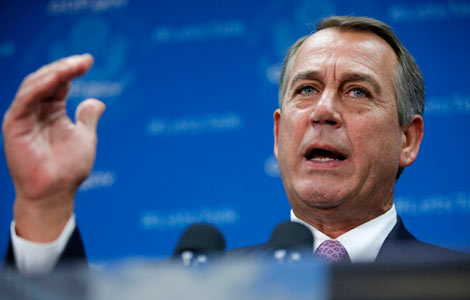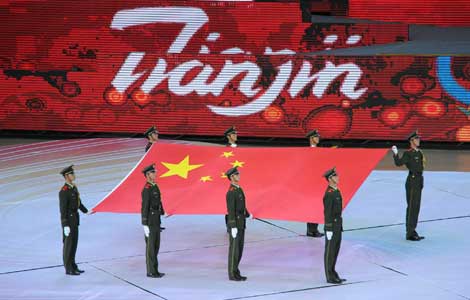McKinsey's China oracle grades his hits and misses
Updated: 2013-10-07 11:08
By Michael Barris in New York (China Daily)
|
||||||||
He blew it.
Back in January, Gordon Orr went out on a limb. The Shanghai-based director with US management-consulting firm McKinsey & Co predicted that China would surprise the world in 2013 by abolishing national holiday weeks.
With millions of Chinese wrapping up their celebration of National Day of China today, it's clear that his forecast missed the mark. But Orr, who has been publishing predictions for McKinsey for five years, admits that one was "more a hope than an expectation".
It was also just one of many calls Orr revisited recently as he graded his overall performance as a China prognosticator.
"Fifteen years ago, when the current structure of mandated vacation weeks was put into place, China's economy was very different," Orr, McKinsey Asia's director and chairman, explained in a McKinsey report early this year called "What's in store for China in 2013?"
"There was a real belief that, without mandated vacations, most workers would never get a holiday or have an opportunity to spend the income they were saving," Orr wrote. "Today, their compulsory holidays merely serve to saturate and overload the country's infrastructure - if anything, reducing the amount of money that people spend on travel and related services as more and more choose to stay at home."
Supporting the case for abolishing - or at least phasing out - vacation weeks, Orr wrote, was the ability of the middle class in China today to "schedule their own vacations when they want to much more readily than they could in the past".
Years ago, "large numbers of state-owned and private-sector enterprises did not meet the legal requirements for vacations," Orr wrote. "But in the age of social media, even factory workers can now name and shame offending employers."
In various roles with New York-based McKinsey, one of the world's most prestigious management consultants, Orr has lived in China for nearly two decades. During that time he has been a frequent speaker at the World Economic Forum's "Summer Davos" meeting of political leaders, academics and journalists in Dalian. Before assuming the role of director and chairman of McKinsey Asia, Orr, who holds a master's of business administration from Harvard Business School, spent five years as managing director of McKinsey's Greater China offices, and was a key figure when McKinsey opened offices in Shanghai in 1993 and Beijing in 1995.
In July, after five years of publishing predictions about China, Orr looked back on the "good guesses, major misses and lessons" he learned as a China oracle. In a report called "Forecasting China," Orr identified what he considered the "highlights and lowlights" of his forecasts from 2009 to the present.
One call he admits he got "spectacularly wrong" was his 2009 prediction that China would leap to embrace electric vehicles. The government that year had called for 500,000 electric, hybrid and other "new energy" vehicles to be produced in the country by 2011. The actual volume turned out to be 15,000, including 10,000 electrics. The fizzled expectations knocked 65 percent off the share price of electric automaker BYD Co, despite US investor Warren Buffett's notable 10 percent stake in the Shenzhen-based company, Orr wrote.
"In China, as elsewhere in the world, consumers have largely rejected electrics, and electric-vehicle technology has failed to live up to the commitments of Chinese companies," Orr wrote. "But the need for electric vehicles is still pressing - if anything, more so given the intense pollution in Beijing earlier this year." Orr predicts "a second wave for electric vehicles in China, but "probably not on a major scale until after 2017".
Another forecast that landed wide of the mark was his 2011 belief that China's government would "meaningfully reduce its stake in state-owned enterprises", particularly in the industrial companies overseen by the State-owned Assets Supervision and Administration Commission. "Instead," Orr wrote, "the status quo well and truly held. Indeed, since 2010, the market share of state-owned enterprises has grown in numerous sectors".
He posted "some easy wins" in 2012, including projecting that sales growth in the Chinese automotive market would slow down. As overall sales growth that year plunged from 32 percent two years earlier to 9 percent, domestic automakers took the brunt of it, seeing growth of just 5 percent. Sales by major joint ventures between local companies and multinationals rose 11 percent.
Forecasting in the Internet age has taught him one thing: It's easy for what he says to come back to haunt him. "Public forecasts never disappear; people still circulate the old ones", he wrote.
"So I'm developing a thick skin," he wrote, comparing himself to a tightrope walker.
michaelbarris@chinadailyusa.com
(China Daily USA 10/07/2013 page9)
Most Viewed
Editor's Picks

|

|

|

|

|

|
Today's Top News
Academics evaluate China at conference
Experts examine core values of China, US
China needs to export ‘public goods’: expert
Sowing the seeds of new business
Chinese investors visit Silicon Valley
Two Chinese die in plane crash near Saipan
Destroying Syria's gas arms started
Direction charted to resolve disputes
US Weekly

|

|














